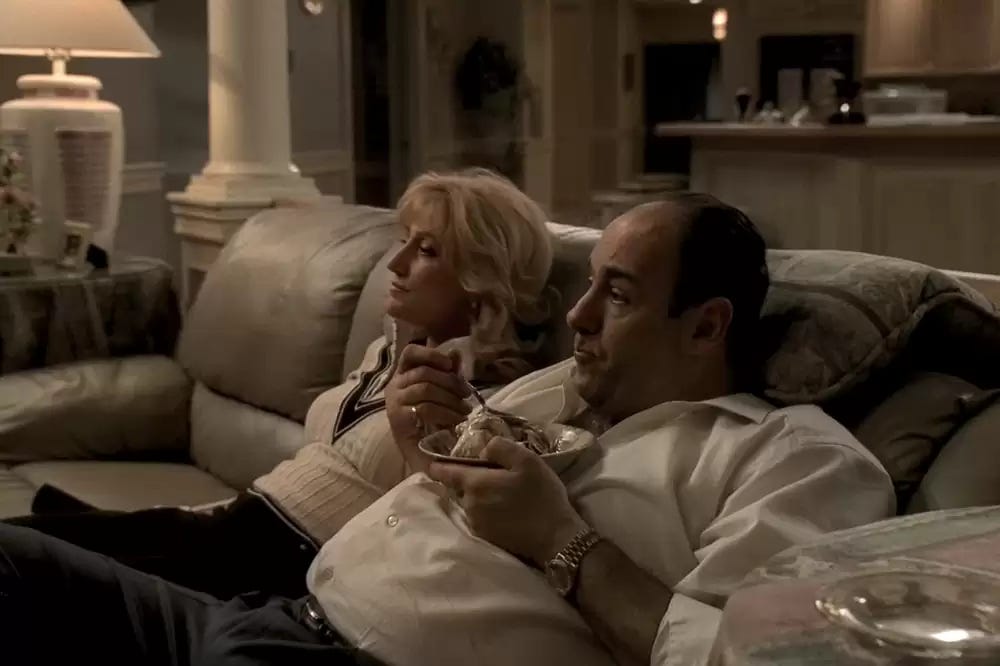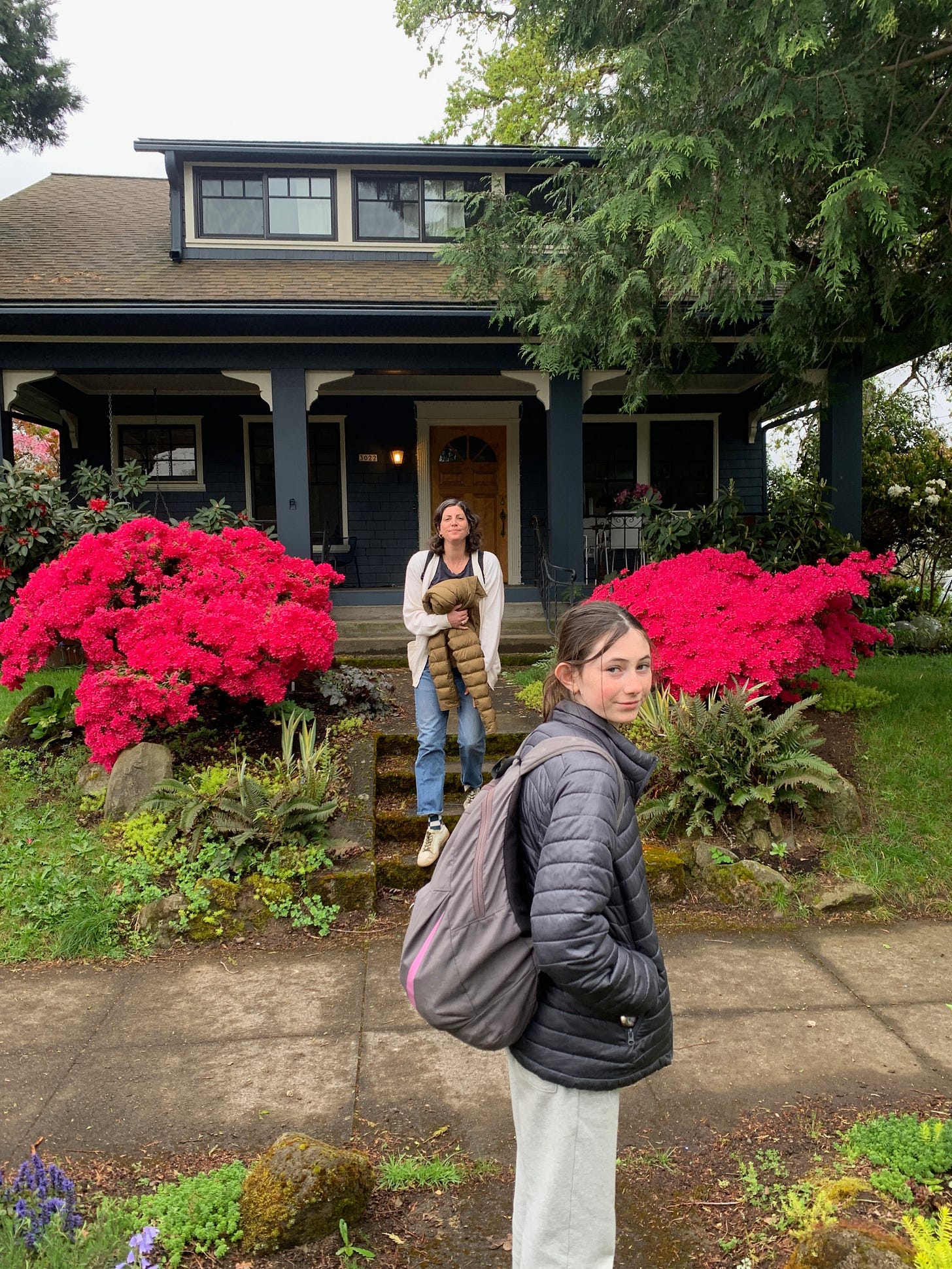Tuesdays with Tony (Soprano)
Insomnia, fictional and real sociopaths, and attempting to make friends with death.
The first night it happened was New Year’s Eve, 2010. We were up on Little Black Mountain, in Cazadero, CA, staying with our friend Judy in her remote home perched on a windy ridge. We’d hiked and partied all day with friends, hunting black trumpet mushrooms as we climbed to the fire lookout at the top of Pole Mountain. As darkness descended, we played old records and danced in the barn, ushering in the new year the same way we’d done each year for the past decade. Around 2 am, sweaty and ready to crash, I washed my face and brushed my teeth, put on threadbare sweats and an old t-shirt, and crawled into a bed piled high with down comforters that Judy made up for me and Andy in the loft.
And then I laid there. Awake. All night.
I was exhausted, but I couldn’t sleep. My mind raced, thinking every possible thought. Every sound, creak, and sigh was an invitation. The minutes were interminable. It was a new kind of torture, time pulled into loops of circular thinking and feverish tossing and turning. When the sun rose, and people began to stir, I was still awake. It was the first of many sleepless nights that would follow; my induction into the terrible club of insomniacs.
15 years later, I’ve learned to manage these bouts of insomnia. I used to suffer through the seemingly endless night, trying fruitlessly to force slumber. The sleeplessness bred anxiety and the anxiety bred sleeplessness. I feared my bed, the hours between 1 and 4 am, and the aching loneliness of wakefulness when everyone I loved was dreaming. Eventually, after extensive research, medical and herbal interventions, I figured out that the best way to approach cyclical insomnia was simply to embrace being awake. If I was alert and ready for action at 3 am, I read a book or a particularly dense New Yorker article. And if that didn’t eventually put me back to sleep, I got up and watched a movie or a TV series.
At 9 pm I can read or watch TV for about 14 minutes. I’m notorious. But at 2:42 am I am a thoughtful and attentive audience. I’ve plowed my way through hundreds of books, harrowing documentaries, ponderous foreign films, and time-swallowing series in these early morning sessions. The gift of anxiety, and now perimenopause, seems to be media consumption on an outsize scale.
This is the preface to admitting that for the past two months, I’ve been carrying on a relationship with Tony Soprano between the hours of 4 and 6 am. I am completely enthralled with his knowing half smile, casual disregard for the use of the “h” sound when he speaks, predilection for ill-fitting synthetic fabrics, cynicism, and wit. I’ve looked away as he’s plotted, murdered, and cheated, forgiving all his sins. I’ve even chuckled at his mouth-breathing, usually an impeachable offense. I do this because I love this terrible man.
I love the way he eats bowls of ice cream by perching them on his chest, lost in the thrill of a delicious treat and an old movie. I love the way he listens to music, slamming his hand arrhythmically against the steering wheel of his car and singing loudly. I love how he kisses grown men, pulling them closely in. And, because I am bearing it all here, I’m amused by the way that he parents his children; with good humor, an ample amount of confusion, and chaotic yet believable affection. Does he yell too much? Definitely. But damn. What would it feel like to yell like that once in a while? To just let it rip?
Tony Soprano is a man of vast, unquenchable appetites. In him, I see pieces of myself— especially the parts that desire and want and can never get enough. In my generous moments, I refer to this as my hedonistic bent; the indulgent, pleasure-seeking impulses that I am constantly gauging and tempering. The pleasure that he telegraphs with each bite of food, his open-mouthed ecstasy and total indulgence thrills me. Through him I can cosplay what it would be like to so brazenly consume, to go out in the world and fill myself to excess and succumb unapologetically to pleasure.
In him, I also see the shadowy side of too much. He is a serial liar, cheater, murderer, and manipulator. He is the extreme of our extremes dwelling in the murkiest corners of the id. His rages, frustrations, and interpersonal trespasses are the expressions of a person unable to manage their emotional world, even after years of therapy. They are also the result of being constantly disappointed and dismayed that the pursuit of pleasure does not or cannot annihilate the pain of being human. He will never be satiated, and so he will always be unhappy.
In many ways, he reminds me of a lot of my college boyfriend, another terrible man I once loved.
On my first day of college, I met the giant who would eventually become my boyfriend. He was 4 years older, living in the dorms (huge red flag) as a transfer student. He brought me weed and alcohol and took me out to a few Thai dinners, and before I knew it I was his girlfriend. I was not attracted to him physically, but he had a kind of magnetic presence that drew people in. He walked through the world with shameless confidence and no discernable doubts or neuroses. I’d never encountered anyone like him before. It was a cult leader-y kind of charisma. I had no precedent for understanding someone like him, and so I had no defenses. By Valentine’s Day, I’d decided to break up with him, but somehow he just wouldn’t let me. I kept trying and failing. And then I simply got tired of trying and gave up.
The world that he constructed was of the two of us versus everyone else. His unflappable sense of self — including his beliefs about the primacy of his intelligence and intuition, and the superiority of his tastes and ideas— isolated us from the community I’d been trying to build. Fragile freshman-year friendships atrophied, and I found myself living solely in the orbit of his ego.
At times it was a pretty fun ride. He spent the money that he made by growing and selling weed without hesitation. We ate out all the time, saw live music on the regular, and bought all the books and records we wanted. The drugs were plentiful and he made me laugh.
He was also prone to rage and paranoia, and just like my friend Tony, he threw tantrums. I remember arriving at his house one night and having a petty disagreement while we parked my car. In a flash, his displeasure turned to malevolence. He climbed out of the car and chucked my keys in the bushes, leaving me to crawl around on my hands and knees in the dark while he stomped into the house.
His anger ultimately manifested in verbal and psychological abuse. When he felt threatened he belittled me or accused me of imaginary transgressions. I made sure never to flirt, laugh too much, or overtly enjoy spending time with anyone else if he was present. According to him, I was always saying the wrong thing or embarrassing him in front of the people he wanted to impress.
At the end of my freshman year, we decided to take a road trip to Oregon and Washington. Against my objections, he insisted on bringing along a 2-foot-long bong, and buying a ferret at a mall in Aberdeen, Washington. The ferret, Kiko, would attack me in my sleeping bag in the middle of the night, biting my toes and scratching my legs. I was terrified of it, but he wouldn’t take it back. When we stopped in Bandon, Oregon on our way back south, we met a couple in their mid-twenties who offered to let us stay in their extra bedroom for the night. All evening he made fun of me, cracking jokes about how young and dumb I was. I remember the woman looking at me hard, as if to say, “You don’t have to stay.” But I did.
Little by little I whittled myself away, folding myself up so that my presence had no hard edges. I made few friends and allowed him to dictate the trajectory of my days. Over time he pushed out anyone who got too close, subtly creating rifts that eventually widened and left me isolated and alone.
I left the country twice to try and extricate myself. When I moved to Budapest during my junior year he surprised me by buying a ticket to visit. He knew I was considering traveling instead of finishing out the second semester, so he informed me that he’d be joining me. And then there he was: bag packed, not enough money in the bank, ready to go.
We spent 3 months traveling in Turkey, Italy, Spain, and Morocco. In Italy, he refused to go in museums or churches, but became obsessed with the men conducting business outside the cafe beneath our pensione in Sicily. He spent the hours between meals of squid ink pasta —I think that’s all we ate the entire week we were there—on the little balcony, watching their comings and goings and hypothesizing about what they might be up to. In Morocco he made friends with a couple of very bad men, embroiling us in a situation so fucked and scary that I am still not ready to write about it.
When I returned to Santa Cruz to finish school, I was committed to getting out. He had other plans for us. He followed me when I went out at night, called me incessantly, intimidated anyone I tried to date, and would only leave my doorstep when my neighbors threatened to call the police. I left the country again during the winter of my senior year, embarking on a field study in Belize and Guatemala, unwinding the twisted tendrils of his abuse as I lugged my 40-pound pack through the broad-leaf jungles. I cried and I cried, awash in the deep shame of my predicament. How had I allowed it to happen to me? How had I lost myself so completely? What the fuck had happened?
You see, he too was Tony Soprano. He was my shadow. He was compelling and repellent. The terrible impulses I tempered with reason and morality, he indulged and exploited. He took what he wanted from life, never worrying about the impact. And that’s all I seemed to do: worry about the impact. I worried about what people thought. I worried about whether or not I was a good person. Whether I ate too much, talked too much, or laughed too loudly. I perseverated about impact. I wilted remembering unkind remarks I’d made, little interpersonal offenses, and possible inflammatory comments. He, on the other hand, trampled the long grasses of life, stomping through to his destination without any thought to who or what might be underfoot.
And what is it like to live that way? In proximity it was thrilling and horrific. I marveled at what he got away with; the way people seemed to bend and yield. Eventually, he’d burn his bridges, and people would get wise to his bullshit, but there were a lot of free drinks, invitations to exclusive spaces, and free rides along the way. He was beloved before he was reviled. Much like Tony.
In retrospect, I realize that he had a personality disorder; his behaviors were pathological and built on ruthless self-interest. I don’t remember him ever taking ownership of the hurt he caused, or apologizing for anything. And unlike Carmela Soprano, I possessed neither the nails (omg her nails deserved an Emmy) nor the strength to counter the force of his will. The only thing I could do was escape.

A few years ago I was leading a discussion in my film history class about antiheroes in The Godfather. I read my students this quote by Alexander Solzhenitsyn from the Gulag Archipelago at the beginning of a discussion:
Gradually it was disclosed to me that the line separating good and evil passes not through states, nor between classes, nor between political parties either -- but right through every human heart -- and through all human hearts. This line shifts. Inside us, it oscillates with the years. And even within hearts overwhelmed by evil, one small bridgehead of good is retained. And even in the best of all hearts, there remains ... an unuprooted small corner of evil.
As our conversation moved from the fictional to the personal, I decided to tell them the Readers Digest version of the story of my ex. One of my students asked me where he was now. I replied that I didn’t know. They begged me to look him up on the internet. Aside from one small mention in a local newspaper almost a decade earlier, the only evidence of his presence on the internet was a mugshot.
In lighter news, I spent the past few months completing a death doula training. It was profound, and world-changing and I think about what I learned every day, which is another way of saying that I think about death every day. I guess I’ve always thought about death every day, but now my thoughts move in directions that feel more curious and grounded, less terrified animal.
In the next few weeks, I’ll begin volunteering with an organization that assists homebound sick and dying people. I’ll go and sit with people who are alone in their final months or days, and I’ll do my best to be calm and still. And if they want, I’ll cook, read to them, listen to their stories, and try to be of service.
I don’t know if this is my next chapter, or my calling, but I keep being pulled in this direction, so I’m seeing where it takes me. In the meantime, I’m grateful for the arrival of spring, and the riotous profusion of flowers throughout our scrappy little city.
And that’s it, my friends.
Thanks as always for sticking with me and taking the time to read these musings.
Sending lots of love.
xo, Belle
Hot Links:
(I finished writing this piece on a plane and could not figure out how to embed links with my phone, so you’ll have to do your own research 😉)
I’ve made you a mix to usher in the warmer weather. It’s a real mash-up.
There’s a lot of hype around the book, Sociopath: A Memoir, (sidenote: The DSM does not use this term anymore, “antisocial personality disorder” is used instead) and the commentary surrounding it is fascinating. The way that people retreat into dualistic thinking about good and evil when they are confronted with people who challenge their beliefs about the roots of human behavior is wild to behold.
Some recent insomnia picks:
Past Lives, Zone of Interest, Anatomy of a Fall.
Still thinking about Anatomy of a Fall. It hits hard and sticks with you. A little bit like Force Majeur, come to think of it.
Being Mortal, by Atul Gawande. If you’re into thinking about aging and the medicalization of death, this is a fascinating read. I’ll admit that it was also a tough read at 3 am.
I’ve been deep in the audiobooks as of late. Here’s a few recent favorites:
The Bone Clocks by David Mitchell (a book I’ve already read but translates into a thrilling audio experience).
The Candy House, by Jennifer Egan (again, not my first read, but the audio version is fantastic).
Leslie F*cking Jones. This is an intimate, hilarious, and surprisingly moving memoir. I love that she will start reading a passage and then totally diverge from the text and talk shit. She is a national treasure.







OOOOF! That was a lot, thanks for sharing. On a Sopranos note I started watching the show before Lyndsay but one evening she saw a scene with Tony on the couch eating his ice cream on belly in a wife beater (sorry if that's offensive) she stared at me and said....THIS IS MY DAD! She was hooked.
Oh my god! We are on the same path these days Belle. Death, insomnia, and TONY!!!! And dope dealing ex boyfriends!! Me toooooo ♥️♥️♥️ Except I’m also jealous of Tony’s option to just murder anyone he finds annoying. Don’t tell 😆